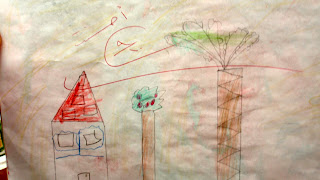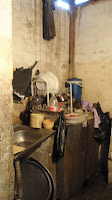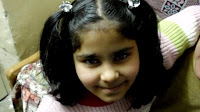We visited Ala'a, his wife, Thuraya, and their two young sons Laith (9 years old) and three year old Abdullah to take a food relief box to them.
Ala'a lived in Baghdad but owned a small gypson board factory in Fallujah until militia took over the shop, stealing all the equipment and stock. Ala'a speculates that he was targeted because he is Shia but, in the lawlessness of Iraq, it could be a case of criminal theft. So many Iraqis we speak with are not certain who the "militia" are as they consistently tell us that the men's faces are covered to hide their identity. After his shop was taken, he stayed in Baghdad until leaving for Jordan.
Thuraya is Sunna and from Baghdad. Before the invasion intermarriage between men and women of different sects was as common as it is in the US for people of different Christian religions to marry. It was usually not an issue one thought about. Now that has changed, of course, as fundamentalists from or influenced by the extreme conservative form of Islam from Iran have free rein and terrorize people into segregation and conservatism. Iraq, a model of liberal secularism in the ME prior to the US invasion is now reverting backwards rapidly.
Both Ala'a and Thuraya's families are scattered now; a few still inside of Iraq, some in Syria, others in diferent European countries. Those remaining in Iraq endure much hardship. Ala'a's brother was threatened and left his city because he worked in a bank that did business with Americans. One of Thuraya's brother-in-laws had been taken prisoner by both Iraqi police and then American forces. Both tortured him badly by electrocution and beatings. Now he is too weak from his injuries to travel but wants desperately to leave Iraq. Ala'a told us that the torture inflicted on this man under US detention was preferrable to that inflicted on him by the Iraqi police "..it was not as bad, no...but yes, the Americans used electrcity, too..." And, while Thuraya was still in Iraq, US forces entered her uncle's house while she was there and beat her teenage nephews in front of her. Another two teenage cousins were taken 3 months ago from outside their home. They disappeared and are assumed killed. Their older brother was killed a year ago by US military when he was inadvertantly caught in cross-fire between US troops and others.
Ala'a tells us that, when the US kills a civilian, the bodies are not released to the family for burial; they are taken to a hospital and held for three days, before the family must go to the hospital to retrieve their loved one's remains. This can put family members in danger because many of the hospitals are controlled, at least in part, by militia. If a family is of a different sect, retrieving their family member can be like walking into a lion's den and they can be murdered. Ala'a tells us that one of his friends had to pay the militia at a hospital $1000 in order to get his brother's body.
Laith was five years old and had to be taken to a hospital in Baghdad. He still talks incessently about seeing the bodies being carried into the hospital. His father tells us that the corpses were tied together in pairs, with gun shot wounds in all of their heads. Laith draws many pictures of the war and of blood. Ala'a tells us "He cannot forget"


Another of Ala'a's sons, Mohammed, who was 18 at the time, was kidnapped and beaten before he escaped. The threats became real and the risks too much for the family to consider staying in Iraq any longer.
Finally, in 2006, Ala'a and Thuraya left Baghdad for Jordan, having waited for the birth of their youngest before taking the harrowing journey. Baby Abdullah was only 20 days old. They first took land transport to the Jordanian border but, when they arrived there, they were told that their paperwork was "not good" and after spending three days on the border trying to get this cleared up, they returned to Baghdad for a second and successful attempt made by air.
They brought significant savings with them to Jordan but living expenses, school tuition, and medical bills have wiped it out completely. Now they are destitute and waiting anxiously for resettlement.
Ala'a has been accepted for resettlement to the US but he has been told that he must make a dificult decision first. This choice has him and his family reeling and in held suspended animation: Because Ala'a has two wives and two families (not uncommon in the Arab world) and US law dictates that he can have only one spouse, he must choose one wife, one family to remain married to and divorce the other. He loves both families equally and he cannot bring himself to determine which to abandon. He is obviously torn in two over this.
Although I cannot see myself agreeing to be in a marriage with another wife, I also know that it is not my place as a guest in this culture to bring my own preferences to the table in our work with Iraqis here. Our intent is to provide Iraqi refugees with what they need for their safety, survival and well-being without judgement and based only on their need. I see that Thuraya has no discomfort in their marriage arrangement and that she shares her husband's angst over this.
I suggest that he choose to divorce one and immigrate with that wife and their children to the US while the divorced wife apply for resettlement for her and their children. Then, once they are all in the US together, Ala'a might remarry the divorced wife in a religious marriage ceremony. But both Ala'a and Thuraya feel that the legal marriage is important. I tell them that there is no solution that I know of, that he can only be legally married to one woman at a time. Their distess is obvious. Thuraya thinks, if she is the one divorced, she may apply for immigration to Australia - perhaps Ala'a can visit her and their sons once he has a legal US passport...
Although it is reasonable to expect immigrants to follow US law no matter how that differs from their country of origin's, it would be humane for long established polygamous families with children to be allowed to immigrate to the same country, under the same resettlement visa so that children and their fathers are not torn from one another.
I have not met Ala'a's first wife and their children yet. Ala'a tells us that he had five children but one recently died of brain cancer. Desperate to save their son's life, they agreed to put him in the only hospital that would agree to give him surgery without having to pay the full amount in advance. Now he owes the hospital 9000 JD and he had to give his passport to the hospital until he pays this bill. They would not allow him to have his son's body until the passport was handed over to them.
They sold all of their furniture and anything of value to pay what they could on this bill and for their living expenses. The small monthly UNHCR cash grants provided to the two families are not enough to pay for their rent and food.
As we prepare to leave, Ala'a asks us, point blank, "So, what can you do for us?" And all we can offer is a box of staple foods. It is appreciated but this family, like every other Iraqi family I meet here, has more needs than we are capable of providing assistance for. I feel frustrated that we can only do so little. I understand that my frustration is only a tiny shadow of the frustration and worry that people here wake up to and endure every day, year after year.
There are no easy answers.
 Laith draws a "dream house" where everything is ok
Laith draws a "dream house" where everything is ok




















































